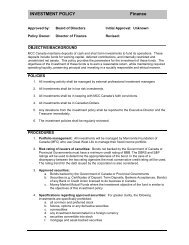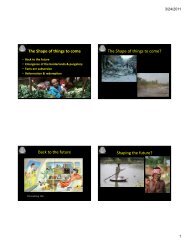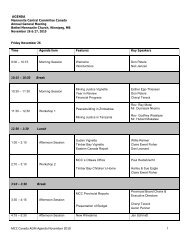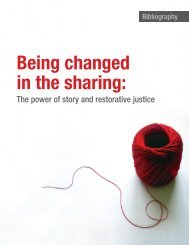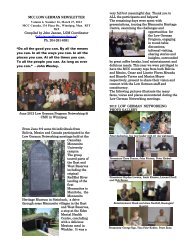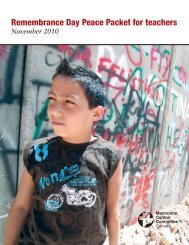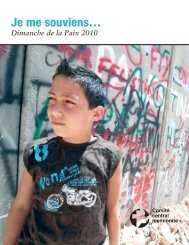Walking together: Healing and hope for Colombian refugees
Walking together: Healing and hope for Colombian refugees
Walking together: Healing and hope for Colombian refugees
You also want an ePaper? Increase the reach of your titles
YUMPU automatically turns print PDFs into web optimized ePapers that Google loves.
104 w a l k i n g t o g e t h e r<br />
STAGES OF ACCULTURATION AND POSSIBLE SERVICE IMPLICATIONS<br />
Physical Events Psychosocial Experience Service Implications<br />
CULT URAL I N T EGRATION<br />
(or Marginalization see Below)<br />
Basic needs met<br />
Some language competence<br />
Employment <strong>and</strong>/or economic<br />
stability<br />
Family relationships<br />
strengthened<br />
Community ties established<br />
Sense of power <strong>and</strong> control<br />
Bicultural identity <strong>for</strong>ged<br />
Self-confidence<br />
Pride in self-sufficiency<br />
Sense of success <strong>and</strong> stable<br />
future “I have a place in this<br />
country.”<br />
May disengage from ESL class<br />
as self-sufficiency <strong>and</strong><br />
English competency is achieved<br />
Sense that class is no longer<br />
needed, that client has moved<br />
beyond it<br />
Increased self-study<br />
May transfer to workplace ESL<br />
May focus on college or other<br />
adult-education options<br />
Inability to use (or lack of<br />
access to) transportation<br />
Poor physical health<br />
Taking care of small children<br />
Mental-health issues<br />
Intergenerational conflict<br />
Possible domestic abuse<br />
Children are not supervised<br />
Especially at risk: older<br />
<strong>refugees</strong> <strong>and</strong> homebound<br />
women<br />
Strong involvement with<br />
institutions: legal, child welfare,<br />
police<br />
Dependence<br />
Unemployment<br />
Legal involvement<br />
Taking on negative roles<br />
Temporary housing or moves<br />
often<br />
Seldom leaves home<br />
Possible involvement in gangs<br />
or crime<br />
Substance or domestic abuse<br />
ALI ENATION<br />
Reluctant to leave home<br />
Not wanting to “take on”<br />
the outside world<br />
Isolation <strong>and</strong> withdrawal<br />
Despair <strong>and</strong> sadness<br />
Suicidal thoughts<br />
Lamenting loss of old roles<br />
Fear they cannot succeed<br />
in Canada<br />
MARGI NALI ZATION<br />
Has given up <strong>hope</strong> of<br />
acculturating or having<br />
a positive role in Canada<br />
Has resentment/negative<br />
attitude<br />
Hopelessness<br />
Seems unreachable<br />
Attendance very sporadic<br />
or student drops out<br />
May have difficulty reaching<br />
student by phone<br />
Intends to but can’t manage<br />
to come to class<br />
Barriers to attendance, i.e.<br />
no transportation, child care<br />
Over-attachment to one teacher,<br />
lever, or program<br />
Time-management,<br />
priority- setting issues<br />
Attendance has ceased<br />
May be impossible to locate<br />
or contact student<br />
Stages of Acculturation & Possible Service Implications chart courtesy of the Center <strong>for</strong> Victims of Torture, 649 Dayton Ave., St. Paul, MN 55104,<br />
www.cvt.org ©Center <strong>for</strong> Victims of Torture



